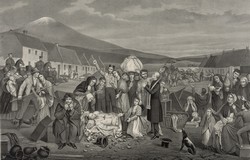Ireland's Great Famine in fiction
The eviction of farmers, one million deaths among the rural population and massive emigration to other parts of the British Empire and the United States brought permanent changes to Ireland’s demographic, political and cultural landscape. A considerable amount of prose texts portraying the years of starvation and diaspora written in both Ireland and North America during the period 1847-1921 remains underexplored. To address the issue, the EU-funded FAMINE (Relocated remembrance: The Great Famine in Irish (diaspora) fiction, 1847-1921) project brought together this underresearched body of literature. Project partners focused on novels and short stories written in Ireland and by Irish Famine immigrants in Britain, Canada and the United States. They examined the developments of Famine memory in 130 texts and determined which aspects of the fiction were key to communicating and reshaping such memories. Over time, the Famine past became more strongly integrated into the narrative consciousness of fiction, and its prevalence is revealed on all levels of society. Famine memory also became increasingly polemic and politicised. Famine fiction written for Irish-Americans and -Canadians was initially infused with nostalgia for a pre-Famine pastoral Ireland that can be explained by the difficult assimilation of Irish immigrants. Novels and stories written for those belonging to the second and third generation became more strongly linked to the cultural legacies of the host societies. In addition, it became progressively multifaceted. Famine memory also gradually moved from ethnically specific communities to mainstream North-American culture, as witnessed by the publication of fiction in popular American and Canadian journals. Overall, findings show that the pattern that has dictated Irish Famine and memory studies needs to be reconsidered. The most severe features of the Famine past are explicitly conveyed in early works, whereas later fiction often uses the rhetoric of trauma in discussing it. FAMINE successfully demonstrated how recollection of a devastating period in Ireland's history is mediated over time and space.




